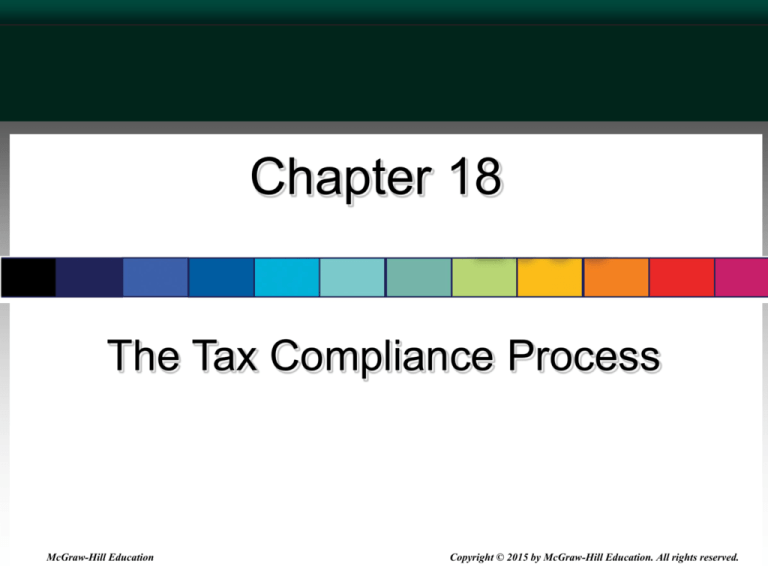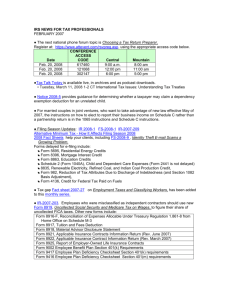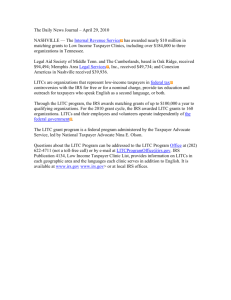
Chapter 18
The Tax Compliance Process
McGraw-Hill Education
Copyright © 2015 by McGraw-Hill Education. All rights reserved.
18-2
Objectives
• Determine the filing date and extended filing date for a tax
return
• Compute a late-filing and late-payment penalty
• Describe the statute of limitations for a tax return
• Identify the three types of IRS audits
• Discuss the reasons why the IRS imposes a negligence or
civil fraud penalty
• Identify the three judicial levels in the tax litigation process
• Define the term transferee liability
• Explain the purpose of the innocent spouse rule
18-3
Taxpayer Responsibility
• The tax laws are so complex that most taxpayers
engage a tax practitioner to prepare their returns
• Taxpayers who rely on professional help remain
responsible for complying with the law and must
bear the consequences of failure to comply
18-4
Filing Requirements
• Required filing dates
• Individual: 15th day of 4th month following close of tax year
(April 15th for calendar year taxpayers)
• Corporate: 15th day of 3rd month following close of tax
year
• Individuals and corporations may apply for an
automatic 6-month extension of time to file a return
• No explanation necessary!
18-5
Payment Requirements
• Taxpayers must pay their tax during the year
• Individuals pay in the form of withholding (from salary
and wages) or through quarterly estimated tax payments
• Corporations pay through quarterly estimated tax payments
• Any unpaid balance of tax must be paid by the
unextended filing date of the return for the year
• Automatic extension of filing date does not extend
payment date for any balance of tax due
• The government charges interest on delinquent tax
payments
18-6
Late-Filing and Late-Payment Penalty
• Amount of the penalty is based on the unpaid
balance of tax due for the year
• If taxpayer is due a refund, there is no late filing penalty
• Penalty:
• 5% of unpaid tax per month or portion thereof that the
return is late (five months maximum)
• .5% of unpaid balance for up to 45 additional months or
portion thereof
18-7
Example of Penalty
• Ms. Burke filed her unextended 2013 Form 1040 on
December 6, 2014
• She had no reasonable cause for filing late
• She paid the $19,200 balance of tax due with the return
Penalty:
• $19,200 × (5% for five months) = $4,800
• $19,200 × (.5% for two additional months plus a portion of
a third month) = $288
• Total penalty = $5,088
18-8
Return Processing
• Income tax returns are processed by 10
IRS service centers
• Returns are checked for mathematical
accuracy and cross-checked against
information returns (e.g., W-2s, 1099s,
Schedule K-1s)
• The fact that the IRS cashed a taxpayer’s
check or mailed a refund does not mean that
the IRS has accepted the accuracy of the
return – only that it has been processed!
18-9
Statute of Limitations
• IRS may select a return for audit three years from
the later of:
• Unextended filing date or
• Date actually filed
• If the taxpayer omits > 25% of gross income, the
statute of limitations extends to six years
• Fraudulent returns are open indefinitely
18-10
Statute of Limitations Example
• Sylvia filed her 2013 return on February 6, 2014.
When is the last day that the IRS can select her
return for audit?
• April 15, 2017
• What if Sylvia had requested an extension and filed
her 2013 return on August 2, 2014?
• August 2, 2017
18-11
Statute of Limitations Example
• Ed, a self-employed roofer, filed his 2013 return on March 9,
2014. Ed omitted income that equaled 40% of gross income
reported on the return
• What is the last day that the IRS can select
his return for audit?
• April 15, 2020
• What if Ed has never filed a return because
all his customers pay cash?
• There is no statute of limitations for Ed’s
tax years
18-12
Record Keeping
• Taxpayers should keep all
documentation such as receipts and
canceled checks for at least three years
after the return is filed
• Records substantiating the tax basis of
property, any legal documents
containing tax information, and copies of
tax returns should be retained
permanently
18-13
The Audit Process
• Corporate returns are selected for audit based on taxable
income and net assets
• Individual returns are scored under the discriminant function
(DIF) system
• The higher the DIF score, the greater the chance that the return
contains an error causing an understatement of tax
• Returns audited most frequently have the following
characteristics:
• High income
• High deductions
• Self-employed business income (Schedule C)
18-14
Three Types of Audits
• Correspondence exams are conducted by mail
• Office exams take place at an IRS office and are
limited in scope
• Field exams take place at the taxpayer’s place of
business and are broader in scope with a complete
analysis of the taxpayer’s books and records
• A deficiency is additional tax assessed as a result
of an audit
• Interest charged on the deficiency is deductible only by
corporate taxpayers.
18-15
Audits and Penalties
• Any person who has made a good faith effort to
comply with the tax law and has maintained
adequate records has nothing to fear from an IRS
audit
18-16
Taxpayer Bill of Rights
• IRS must deal with every taxpayer in a fair,
professional, prompt, and courteous manner
• IRS must provide the technical help needed to comply
with the law
• Taxpayers’ information is confidential. However, the IRS
may share information with other governmental authorities
• National Taxpayer Advocate office assists taxpayers in
resolving problems and helps taxpayers who suffer
hardship due to IRS actions
18-17
Noncompliance Penalties - Negligence
• Applies when the IRS determines that the taxpayer
did not make a good faith effort to compute the
correct tax
• Penalty = 20% of any underpayment attributable to
negligence
• Negligence versus mistake?
• Based on the complexity of issues, taxpayer’s education
and experience, cooperation with IRS, and advice from
professionals
• IRS must show a preponderance of evidence
18-18
Noncompliance Penalties - Civil Fraud
• Penalty = 75% of any underpayment attributable to
fraud
• IRS must show clear and convincing evidence
• Fraud is the willful intent to cheat the government
by deliberately understating tax liability
• Systematically omitting income
• Deducting nonexistent expenses
• Keeping two sets of books
18-19
Noncompliance Penalties - Criminal Fraud
• Tax evasion = criminal fraud = felony offense!
• Penalty = up to $100,000 for individuals, $500,000 for
corporations
• Prison time may result
• Government must demonstrate guilt beyond a reasonable
doubt
18-20
Tax Return Preparer Penalties
• Tax return preparer is any person who prepares
returns for compensation
• Preparer penalties include:
• Failure to sign a return as preparer - $50 per failure
• Taking a unreasonable legal position in preparing a return
• greater of $1,000 or 50% of compensation for return
• Intentional disregard of the law in preparing a return
• greater of $5,000 or 50% of compensation for return
• Monetary fines are not large, but the detriment to
the preparer’s reputation is HUGE!
18-21
Contesting Audit Results - Appeal
• Contact the IRS Problem Resolution department
• Administrative appeal is the next step
• See Publication 5, Appeal Rights and How to Prepare a
Protest If You Don’t Agree
• If administrative appeal fails,
litigation is the next step
18-22
Contesting Audit Results - Litigation
• Trial courts include:
• U.S. Tax Court (single judge or panel of judges)
• Taxpayer does not pay deficiency
• U.S. District Court (jury trial) or U.S. Court of Federal
Claims (single judge or panel of judges)
• Taxpayer pays deficiency and sues for refund
18-23
Contesting Audit Results - Litigation
• U.S. Circuit Courts of Appeal (13 in number)
• U.S. Supreme Court (hears very few tax cases)
18-24
Small Tax Case Division
• Congress established a Small Tax Case Division to
make judicial relief more accessible to the average
person
• Available for deficiencies of $50,000 or less
• Filing fee is only $60, and the taxpayer may act as his
own counsel
• Appeals are not allowed
18-25
Frivolous Tax Positions
• Congress has little tolerance for
people who waste federal time and
money by initiating foolish lawsuits
against the IRS
• The Tax Court can impose a
penalty up to $25,000 on a
taxpayer who takes a frivolous
position before the court
18-26
IRS Collections
• IRS can seize property, levy bank accounts, and
garnish wages
• If individuals can’t pay, IRS may
agree to an installment payment plan
or accept an offer in compromise
for lesser amount
• When corporations are dissolved, shareholders have
transferee liability for unpaid taxes up to the value of any
assets received on liquidation
18-27
Innocent Spouse Rule
• One spouse may not be responsible for deficiencies
attributable to the other spouse if three conditions
are met
• Deficiency must be attributable
to erroneous items of other spouse
• Spouse must establish that he or she
didn’t know that the return understated
the correct tax
• It is inequitable to hold the spouse liable for deficiency
• Relief is unavailable if spouse received any benefit from
evaded/avoided taxes
18-28




